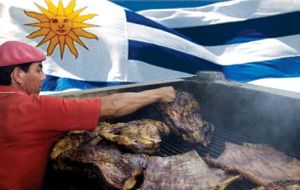MercoPress. South Atlantic News Agency
In two years Argentina’s cattle herd lost 15% and is down to 49 million
 Uruguay has replaced Argentina as top per capita beef consumers and sixth world exporter
Uruguay has replaced Argentina as top per capita beef consumers and sixth world exporter Argentines have lost their title as the world’s biggest beef eaters after the worst drought in 70 years and government export limits to contain domestic prices led ranchers to reduce the number of cattle on the Pampas. Exports have also fallen drastically.
Consumption is slumping to 57.3 kilos a year, the lowest since 1958 and below neighboring Uruguay, where each person consumes as much as 60 kilos annually, according to beef industry associations in the two countries.
The decline in cattle numbers will “be even worse next year” because fewer calves were born during the two-year drought that ended in 2009, said Ricardo Buryaile, a rancher and congressman who heads the Agriculture and Livestock Committee in the Lower House.
The reduced herd caused shipments from what was once the world’s biggest beef exporter to plunge about 50% this year, allowing Uruguay to pass it as a global supplier. The contraction is hurting meatpacker profits, leading Brazil’s JBS SA, the world’s biggest producer of the red meat, to consider selling plants in Argentina.
Argentina’s Ministry of Agriculture forecasts beef exports will exceed 360,000 tons in 2010, ministry spokesman Pablo Lopez said this week. Last year, Argentina exported compared 419,337 tons, ministry data show.
Argentina’s drought, which lasted from 2007 until early last year, parched pastures, cut wheat production to its lowest since 1975 and reduced soybean harvests by as much as a third, according to government data.
Faced with a lack of forage and export controls that prevented prices from reflecting international values, ranchers sent a record number of animals for slaughter last year, Buryaile said.
During the past two years, the national herd dropped 15% to 49 million head, data produced by the Buenos Aires- based Argentine Agricultural Sanitary Agency show.
In the first six months of 2010, beef production dropped 21% to 1.3 million tons, according to Argentina’s National Beef Promotion Institute, known as IPCVA. In the same period, average per capita consumption fell to an annualized rate of 57.2 kilos from 69 kilos in 2009.
Brazil, the world’s biggest beef producer and exporter, processed 8.95 million tons in 2009, according to the Washington-based U.S. Department of Agriculture.
In Uruguay, consumption ran at an annualized rate of 58.2 kilos per person in the first eight months of this year, the same as in 2009, and may rise to as much as 60 kilos per person by the end of 2010, according to Beatriz Luna, spokeswoman for the Montevideo-based Uruguayan National Beef Institute, or INAC.
After overtaking Argentina as a beef exporter, Uruguay now ranks sixth in the world, with Argentina seventh, according to Miguel Jairala, a statistician at the Buenos Aires-based IPCVA.
In the first seven months of this year, Argentina’s shipments abroad fell to 110,000 tons from 222,000 tons a year earlier, IPCVA data show. Shipments from Uruguay rose to 161,317 tons from 147,526 in the same period, according to INAC.




Top Comments
Disclaimer & comment rules-

-

-

Read all commentsway to go CFK ruin another100 yr old business! YEA for Socialism and Redistribution of wealth. GO CHAVEZ!
Sep 24th, 2010 - 04:06 am 0Not just a 100 year old business, but the business which built Argentina.
Sep 24th, 2010 - 04:26 am 0Almost a cow each
Sep 24th, 2010 - 06:08 am 0Still they have the great cow ruining the place sorry running
Commenting for this story is now closed.
If you have a Facebook account, become a fan and comment on our Facebook Page!